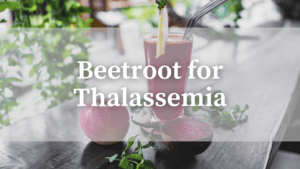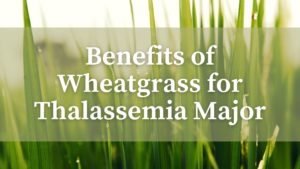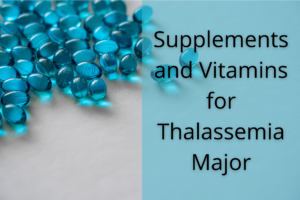What is Thalassemia Major?
Thalassemia Major is a genetic blood disorder caused when the body is not able to make enough hemoglobin.
This results in the need for regular blood transfusions to keep the hemoglobin up.
Regular blood transfusions in Thalassemia Major lead to high levels of iron in the blood that the body can’t get rid of.
When this iron is deposited into vital organs, such as the heart and liver, it can cause severe organ damage if left untreated.
For people with iron overload in Thalassemia Major, the most effective way to reduce the amount of ferritin in the body is through iron chelation therapy using Desferal, Exjade, or Ferriprox.
Did you know there are natural iron chelators that you can add to your diet to improve your iron chelation?
Check out this article on the 4 Great Natural Iron Chelators
In addition to chelation therapy, it is recommended that you eat the right foods, vitamins, and supplements. Any diet for thalassemia major will have two targets:
- Improving hemoglobin
- Chelating iron and reducing oxidative stress
Let’s look at the best diet for thalassemia major, including foods to eat, foods to avoid, and supplements to take.
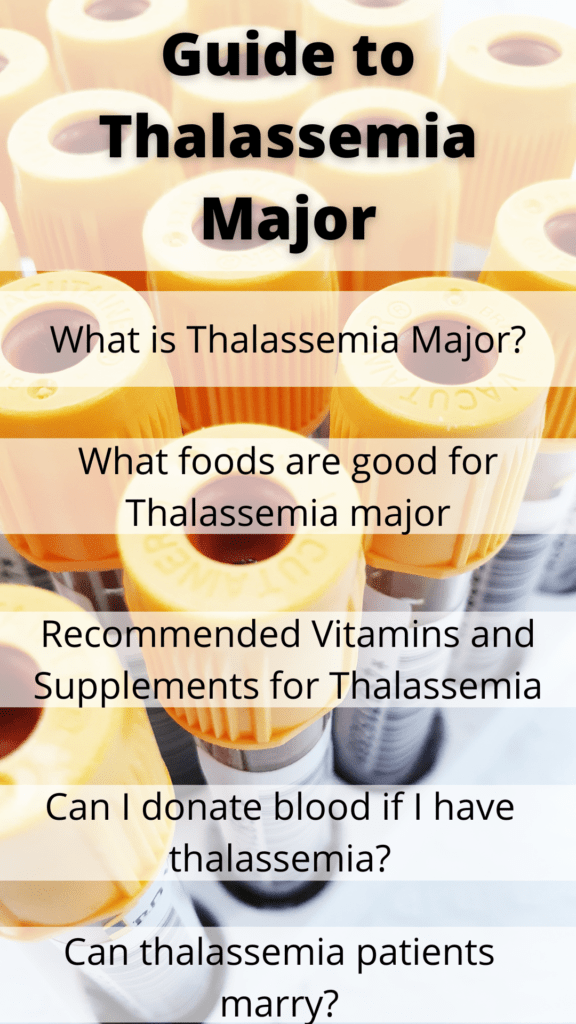 What foods are good for Thalassemia major
What foods are good for Thalassemia major
Fruits and vegetables
With Thalassemia Major, the excess iron can increase oxidative stress and free radical activity, which can lead to damage to your DNA.
This is where antioxidants come in.
Antioxidants are essential in protecting your body and organs from oxidative stress. So where do you get these antioxidants?
From fruits and vegetables of course!
Antioxidants like vitamin E, vitamin C, and flavonoids are packed in colored fruits and vegetables.
So make sure you are eating a wide range of colorful fruits and veggies!
However, keep in mind that you should not be eating too much vitamin C. Doctors recommend that it should only be taken with regular iron chelation therapy and not without it as it increases iron absorption.
Green vegetables are also great for you as they contain the much-required vitamins, minerals, and fiber to fulfill a thals daily nutritional needs.
Grains and legumes
Grains and legumes contain a substance called phytic acid which is great at inhibiting iron absorption.
Did you know that a diet high in grains can put some people at risk of iron, calcium, and zinc deficiencies? This is because phytic acid stops the absorption of these minerals from the gut.
So, for people with thalassemia, this phytic acid will help to keep the body from over-absorbing iron from foods and will, in turn, protect the organs from oxidative stress.
Read this article I wrote on IP6 (phytic acid). It has all the information you need regarding using phytic acid for iron chelation.
Eggs
Eggs are a source of riboflavin (vitamin b2), vitamin B12, vitamin D, selenium, and iodine. On top of that they are considered one of the best sources of protein as they contain all the amino acids that are essential for your body.
Research has also shown that eggs may help reduce iron absorption as they contain phosvitin.
Another study conducted on rats showed decreased absorption of iron, magnesium, and calcium when they were fed eggs.
How cool is that? I just love eggs because of this.
One of my favorite foods and it is actually good for reducing iron absorption!
Tea, coffee and green tea
Tea and coffee contain substances called tannins which also have shown the ability to inhibit iron absorption.
And for this reason, I drink a cup of tea after every meal. If you’re not a tea fan, go for coffee, and if you don’t like coffee go for green tea!
They’re all great at this.
You can even add green tea extract to your diet to benefit from this property of green tea.
Have you ever tried Wheatgrass?
Check out this article I wrote on Wheatgrass for Thalassemia Major
Protein
Protein is very important for every human being. It is one of the basic things that your body needs to function and maintain itself.
Unfortunately, some of the best sources of protein contain the highest amount of iron as well.
But there are still plenty of other options to choose from.
So, plan your meals around protein sources like turkey, eggs, chicken, and tuna which are lower in iron.
Try to avoid dark meats like beef and liver. If you’ve had high-iron food, try to drink tea, coffee, or green tea after as it may help reduce the iron absorption from your meal.
Having them occasionally is okay, but don’t make it a part of your daily diet.
What foods are not good for Thalassemia major
Foods with high heme iron or foods fortified with iron are generally not good for Thalassemia Major and should be avoided. However, all thals should eat a healthy, natural, and balanced diet to ensure their nutritional requirements are fulfilled.
For this, thalassemia.com recommends eating a diet with all color foods.
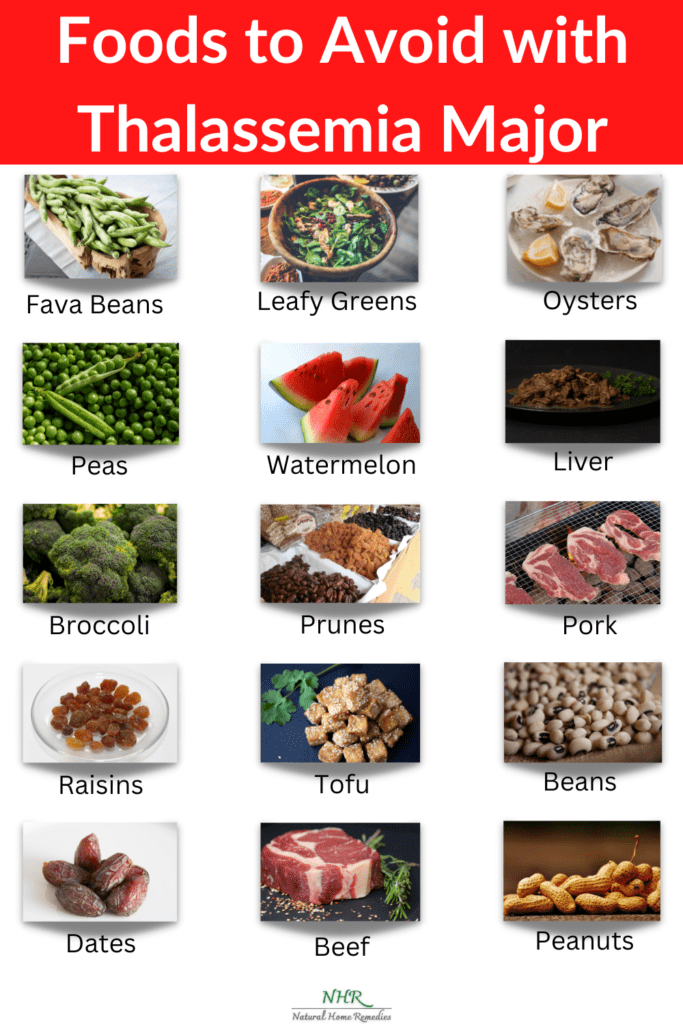
Recommended Vitamins and Supplements for Thalassemia
Thalassemia patients need vitamins and supplements to ensure their nutritional needs are met as our diets and routines in this day and age are generally not sufficient. So check out this article I wrote on all the Vitamins and Supplements I take as a Thalassemia Major patient and I would recommend you add these to your diet as well (after your doctor’s permission of course).
Can thalassemia major be cured?
Previously, bone marrow transplant from a matched donor was the only option. However, now there are emerging treatments like Luspatercept, Casegevy and Zynteglo which are already approved by FDA and have shown to be quite promising.
Can thalassemia drink alcohol?
Is fish good for thalassemia?
Is banana good for thalassemia?
Is beetroot good for thalassemia?
Can I donate blood if I have thalassemia?
Most hospitals will not let you donate blood if you have thalassemia. However, people with thalassemia minor with good health, having hemoglobin over 12.5 may be allowed to donate blood.
For thalassemia majors, it is not possible to donate blood as they themselves rely on blood transfusions.
Can thalassemia minor become major?
Thalassemia minor cannot become major as this is a genetic trait.
A person can only be born with it and cannot develop it later on in life as with any other medical condition.
How long do thalassemia major patients live?
Thalassemia major patients have a normal life with regular iron chelation and timely blood transfusions. Thalassemia major patients are now leading normal healthy lives in countries that offer quality care.
Can thalassemia patients marry?
Thalassemia patients can marry and have children. Even people with thalassemia major can marry and have healthy children if their spouses do not have the thalassemia trait.
Over the years, quality of care for thalassemia major has greatly improved offering longer and healthier lives to thalassemics. There are a few things you need to make sure you do if you want to have a healthy life and are looking to get married and have children:
- Keep your pretransfusion hemoglobin levels above 9.5
- Go hard on iron chelation and try to maintain a ferritin level below 1000
- Eat a natural, well balanced diet
- Focus on your fitness through exercise. This can be anything like walking, cycling, swimming, muscle training, aerobics, or whatever you like. Just keep moving those joints and pumping those heart muscles.
- Have your spouse-to-be tested for the thalassemia trait before getting married.

